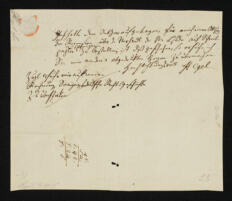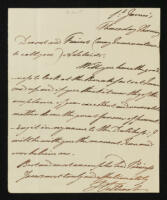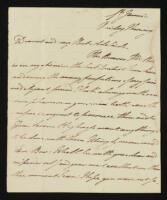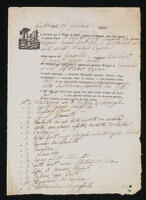Dryden Nr Edinburgh. Has not heard from Sharp since he left England, anxiety caused by late harvest, urges Davis to do more foreign business in the city
Discusses alterations to a Parliamentary bill
London. Death of Mr Wilson
Pisa. Discusses health matters, thanks for books, Mackintosh's article, the discovery of new fragments of Cicero
London. Requests paper to be delivered to Hay and Turner on his account.
Slough - WW and George Peacock have 'absolutely turned his [Babbage] brain by your inflammatory conversation'. Babbage has been 'running analysis mad' and so has JH: 'I really have read and written more in the last fortnight than ever I did in twice the time in any other part of my life and I advise you to go and do likewise'. 'The distress of the poor and the pressure of the times forms the subject of conversation here'.
Slough - Baker, [Richard] Gwatkin and Wilkinson have been staying with JH. He is pleased WW is undertaking something definite but wishes it was 'something entirely original. Still I hope your transl. of the application of Geom.y to Alg. will be useful'. WW should give all the forms relative to ellipses of small and large excentricity. A 'compendium of them is a great desiderium'. There 'are divers forms respecting the intersection of strait lines in space which are of the most eminent use in optics which would be valuable'. JH has been working at the demonstration of Stewart's theorems. JH's work on algebra 'goes on steadily but not very rapidly'. Judging by WW's query it does not look as if he is doing much about functions.
JH and Babbage are 'analysing outrageously'. Could WW ask [George] Peacock whether he is making progress in the printing of a work entitled 'A Supplement to Lacroix' which should have been published some months ago.
Direction: 'An die Mohr u- Wintersche, Buchhandlung'.
Reports the death of Francis Horner, proposes a monument, danger to Lord Holland in becoming Rector of St Paul's Covent Garden, no distress among the Poor
Wimbledon. Sharp has declined a request to stand as MP for Leominster, Tierney suggests Hull if Lord Mahon does not stand
Discusses the affair of Lord Colchester, speaker of the House of Commons
Lists Members of Parliament shouting "No" when thanks to the Speaker were proposed
Returns Lord Holland's letter, glad to hear that Sharps Parliamentary matters are managed to his satisfaction
32 Sackville Street. Requests sending of "above articles" and of new catalogue
The Brighton Road - Belated thanks for WW's account of Stevin's [Simon Stevin] investigations about the composition and resolution of forces. JH finds what WW says of Stevin agreeable to what Lagrange says. JH has not been employed in experiments on polarization for some months, and instead has been 'familiarizing myself with the known phenomena, and acquiring that practical habit of experimentation without which it is useless to attempt anything new'. [David] Brewster's discovery of more than one polarising axis in various crystals is a most important discovery, and completely upsets [Jean Baptiste] Biot's division of doubly refracting crystals into attractive and repulsive. JH gives a description of his inquiries and where his experimental observations differ from Brewster's: 'I observed that the phenomenon of the miniature polarised rings which Brewster spoke of in a former paper, was very different in appearance and position from what his description had led me to expect'. Instead 'of one set of ellipses, complete or nearly so seen along the axis, I saw two half sets cut off across their conjugate axes, and equally distant from the axis of the nitre prism'. Brewster places nitre among the class of salts with two axes, and JH has observed three and even contiguous sets of rings.
Upper Brook Street. Discusses the conveyance of Mr Yates' life interest in property
183 Fleet Street. Requests a copy of toasts to be used to be used in the evening. With an endorsement made in 1823 concerning the imprisonment of Carlile.
Gatcombe Park. Mr Boddington still ill, favourable reviews of Ricardo's book in the "Edinburgh Review", fears that the Bank of England will not resume cash payments next year, Mr Mill has been staying
Ryde. Encloses letter from Phillips, aware that "something was going on of that nature", living in a cottage with water close by, Boddington's severe fall
49 Charlotte St., Portland Pl. - Thanks WW for his Mechanics [An Elementary Treatise on Mechanics, 1819]: WW has made too many 'concessions to the cramming system...and that the work would have been productive of more extensive good...had you conformed a little more to the taste of the age and a little less to that of the University'. JH has recommended WW's application to become a fellow of the Royal Society to Joseph Banks. 'Peacock's pamphlet is singularly stupid' and not worth being made the subject of a paper war. The new rules of the [Cambridge Philosophical] Society 'are very good with I think one exception, that which seems to authorize a system of debating on motions. If this be permitted I cannot conceive the possibility of the Society holding together long or maintaining its respectability'. JH thinks the meetings might receive great additional interest by admitting 2 sorts of communications to be read, one in the form of memoirs, formally got up with a view to publication, and another of a less formal character, containing notices of new facts, sketches of new views, such as give a kind of half publicity by being thus read in public, and thus at once send to secure a claim in case of future discovery, and to excite an interest in the pursuit of truths by railing a kind of philosophical hue and cry'. JH is to read his paper on polarisation to the Royal Society on Thursday: 'The object of the paper is to upset certain overhasty generalisations, a nuisance too common in optical science, and to prove the competency of Biot's theory of periodicity to explain all the phenomena of the polarised rings, which in crystals with 2 axes have hitherto presented anomalies of the most perplexing kind'.
Discusses an article on Pope Pius VI by Ugo Foscolo, admirable speech by David Ricardo
Upper Brook Street. Apologises for his absence the previous night when Malthus was also unable to attend
Venice.—Certifies that R. B. Hoppner, the British Consul, has embarked, on Lord Byron’s account, certain goods aboard the Divina Providenza, bound for Ravenna.
Devonshire Rd, Portland Place - Babbage received WW's thirty guineas and has paid 31 for his fees at the Royal Society. Three members of the Astronomical Society have donated 100 guineas toward the Cambridge Observatory (50 came from William Pearson). 'Sir J. B [Joseph Banks] is about to resign and has recommended Davies Gilbert. But all sorts of plans speculations and schemes are afloat, and all sorts of people proper and improper are penetrated with the desire of wielding the sceptre of science. Whether this elective throne shall be filled by a philosopher or peer a priest or prince is a problem pendent on the fortuitous course of events. The Society is in a position of unstable equilibrium or rather it is like a comet which has not made up its mind whether it shall soberly circulate round the light of truth or traverse boundless space through endless time frying and damning the predestined infidels of other systems until some starry giant shall fascinate to its destruction this erring ball which has "run a muck" through creation'.
![Letter from James Bailey to [John Nichols?]](/uploads/r/trinity-college-library/1/d/a/1daae17060d4ab247ba48597e73450bb6f3f9c7cb308d0da3cb6120199af5691/O.11a.1.32_thumb.jpg)
![Letter from James Bailey to [John Nichols?]](/uploads/r/trinity-college-library/2/7/b/27bcbf6c66828366423f7b68cc195cfa05dd4d6090ab04dcb1154a84b875031d/O.11a.1.33_thumb.jpg)



![Letter from Francis Horner to [John Wishaw]](/uploads/r/trinity-college-library/5/4/0/5405efd282d02289a30b30cac9f9d5a61f23101719f82c35b0d6896df8615522/023.SRMS.B12.9.front.tmb.jpg)






![Letter from Sydney Smith to [John] Wisham](/uploads/r/trinity-college-library/9/a/b/9ab07b18f30e003ab9a06a529655259b8bfc0b4788d3b48923e6237805dbe996/002.SRMS.B20.1.front.tmb.jpg)






![Letter from David Ricardo to [William Fry]](/uploads/r/trinity-college-library/e/f/9/ef9add8637388c3fafd703224e298ee3389374af334bea8256deb0a90dd1fee0/004.SRMS.B19.2r.tmb.jpg)
![Letter from Richard Carlile to [Thomas Clio] Rickman](/uploads/r/trinity-college-library/1/f/8/1f81913a3980b50d55a84ee80090e57df65516987d5e77891efeb7e852b59fe8/002.SRMS.B23.1.front.tmb.jpg)





